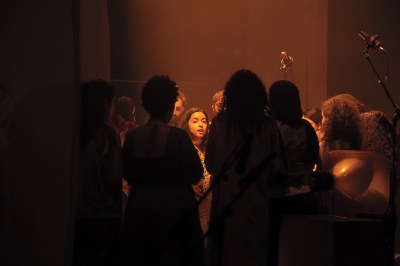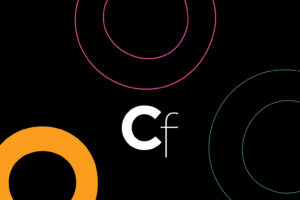Sound Artist Bint Mbareh Tunes into Palestinian Resistance

“Metaphors are necessary for change,” said Bint Mbareh, who animates her work with the metaphor of waves: waves of water, waves of sound. She grew up in Ramallah, in the Israeli-occupied West Bank, and her sound art and installations engage layered meanings of water for Palestinians, as a material that is both violent and sacred.
As a student at Goldsmiths in London, Bint Mbareh (a stage name, assumed when the artist first started making sound work around 2019) studied Palestinian rain-summoning songs. They weren’t songs she knew, because they are very geographically specific and, as is the case for so many Palestinians, displacement figures on both sides of her family. “What that meant for me was that I would never sing with a grandmother in an organic way, the way that music is passed down,” she explained.
Bint Mbareh took up the challenge of learning the songs herself, but she doesn’t sing them as they were sung in the past. In works like Time Flows in All Directions: Water Flows Through Me, first performed in 2020, she twists and destabilizes them, using digital technology while singing live to loop, layer, and remix the sounds of her voice and different instruments. The instability prevents listeners from getting too comfortable, paralleling the tumult of Palestine’s own environment.
From her home base in London, Bint Mbareh started using the medium of what she conceptually calls a “choir”—a gathering of peers, collaborators, and friends who give collective voice to their grief in the aftermath of October 7, 2023. “It’s a medium that’s literally breaking the borders between our bodies,” she said. Last summer, she was invited to perform with one iteration of her choir at an Artists for Aid benefit concert in London organized by the musician Mustafa the Poet, along with Clairo, FKA twigs, and Blood Orange. She presented another choir-based interactive performance at Tate Modern last fall as part of a conference titled “Waterways: Arteries, rhythms and kinship.”

Bint Mbareh performing at the 2024 Artists for Aid event in London.
Photo Alfi Moss-White
Since October 7, her work has taken on more physical forms beyond the realm of performance. Installation works like Bodies of Knowledge (shown last year at the Royal College of Art) and What’s Left? (in this year’s Sharjah Biennial) incorporate sounds as well as water in tanks that vibrate from the sound. In What’s Left?,Bint Mbareh added a tiny toy car and marbles to the tanks, evoking an eerie sense of childhood.
Despite her subject matter, there’s often an almost jarring element of humor and lightness in her work. “I feel like it is a huge privilege to be able to make art that is political,” she said, “but so much needs to be made fun of.” As for her name, “bint mbareh” is “something your mother-in-law would say to you,” she explained, with a laugh. “It means like when you say someone was ‘born yesterday.’”
With her complex blend of levity and depth, Bint Mbareh holds humor in one hand and the high stakes of survival in the other—all to explore what she calls “the most literal ways that sound can be resistance.”





